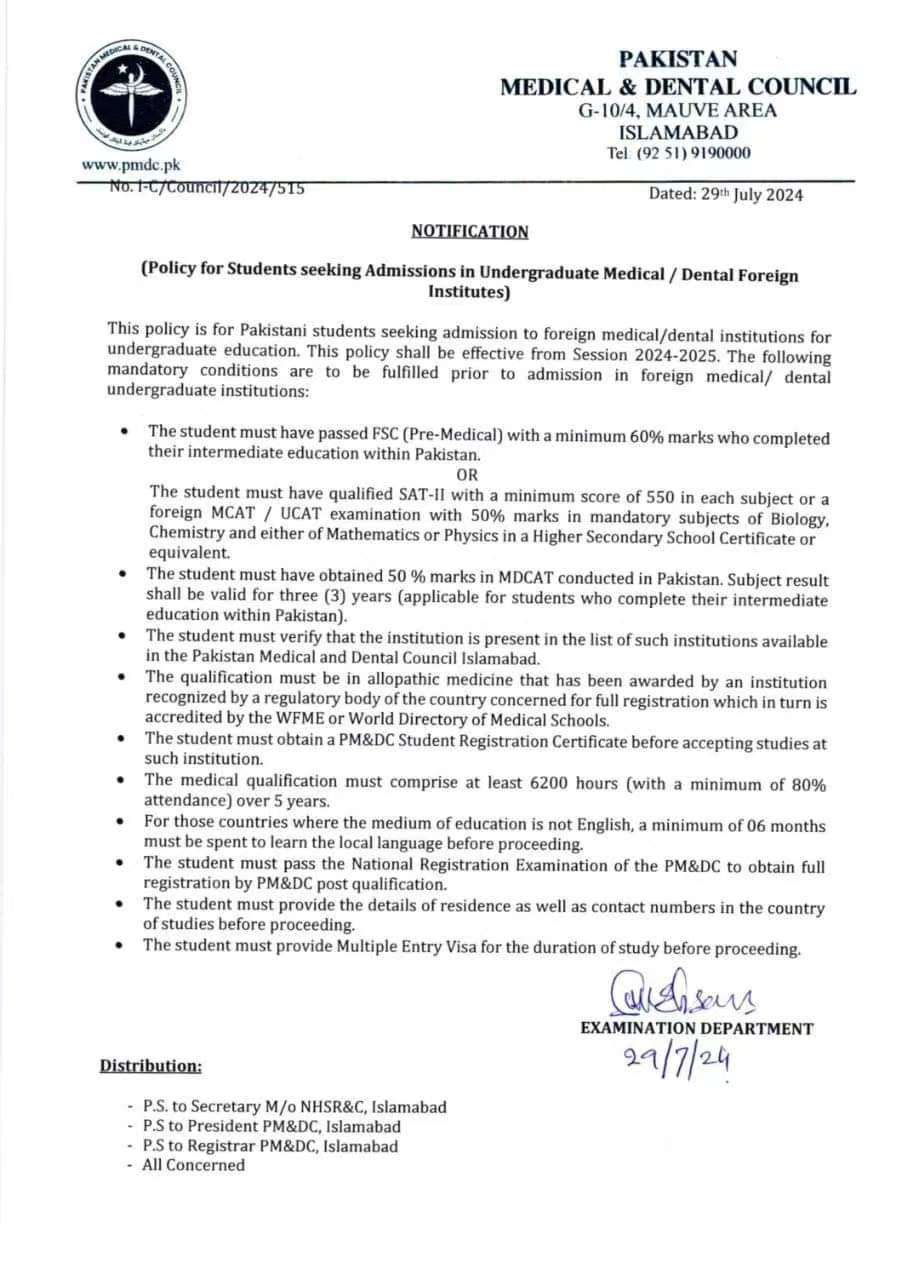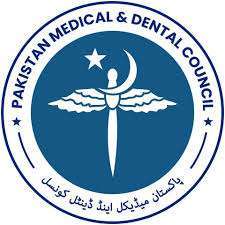
Pakistan Medical and Dental Council (PM&DC) announced the New Policy for Students seeking Admissions: 2024-2025 for Pakistani students who want or wish to seek medical education from abroad, like in China, Russia, Kyrgyzstan, Uzbekistan and others. Before pursuing MBBS or BDS from foreign countries, Pakistani pre-medical students must adhere to the recent laws and regulations of PM&DC.

Introduction of the New Policy for Students seeking Admissions
The new policy from the incumbent government has created more challenges for Pakistani medical students to study abroad after the new update regarding the NO OBJECTION CERTIFICATE (NOC) from PM&DC.
A major policy change has created hurdles for Pakistani medical students, who will now need an NOC (no-objections certificate) from the medical body to pursue medical and dental education in foreign countries.
Under the new law, no Pakistani student is allowed to study medicine abroad without getting a clearance nod (often used to indicate agreement or approval) from the PM&DC.
The contentious move aims to address the issue that many Pakistani students are enrolling in foreign universities that are not recognized by the respective host countries.
In this article, we will discuss the all-new policy announced by the incumbent government and explain the facts and figures of the policy.
We will also discuss the impact of this policy on the previous students and the students who will seek education after this policy.

The new policies are the following
1-The student must have passed FSC (pre-medical) with a minimum of 60% marks and completed their intermediate education in Pakistan.
Furthermore, this policy also ensures that if the student wants to be admitted to the United States rather than China or Russia, if a student wants to take admission in the United States, they must pass the SAT (scholastic Assignment test) with a minimum of 550 marks, and for Canada and the UK, students must pass the foreign MCAT (medical college admission test) and UCAT (university clinical aptitude test) with a minimum 50% for each student or equivalent.
2-The student must have passed the MDCAT with a minimum of 50% marks, conducted in Pakistan.
The duration of the MDCAT results will be valid for three years.
[Like if the student did their MDCAT in years 2022 and 2023, they can easily apply to get admission into an international university, and if the student did their MDCAT in 2024 and doesn’t take admission into an international university, and if he or she wants to take admission in 2025 or 2026, they can easily get the admission because of 3 years of validation]
3-The foreign university at which students want to study medicine must be on the list of the PM&DC.
According to official data, around 3000 Pakistani students are seeking medical education abroad, predominantly in China, followed by central Asian states such as Kyrgyzstan, Uzbekistan, Tajikistan or other countries. Other popular destinations include Russia and Ukraine.
Currently, there are an estimated 15000-18000 Pakistani students studying medical and dental education abroad, with an annual expenditure of approximately 300 million US dollars.
So, this new step was taken by PM&DC to safeguard these students’ future and their parents’ precious money and savings (they are investing in their children for a good future and ensuring they receive an education that meets acceptable standards).
4- After students check if these universities are accredited by WFME (World Federation for Medical Education) or WDOMS (World Directory Of Medical Schools), the qualifications of these universities must be in allopathic medicine.
[WFME is an organization that aims to enhance the quality of medical education worldwide through various initiatives, standards, and collaboration.
WDOMS is an organization with a comprehensive list of medical schools worldwide.
Allopathic medicine qualifications typically refer to the education and training required to become a licensed allopathic physician (MD). These qualifications show that a physician is well-prepared to diagnose and treat patients using evidence-based practices.
5-All the students must obtain PM&DC student registration certificates before accepting studies in such institutions.

6- The medical qualifications must comprise 6200 hours and 80% attendance over 5 years.
It is a very good policy because medical students need to focus on their studies unless they are engaged in other activities.
If they focus on other activities, how would they attend their classes, and how would they discipline themselves?
[Discipline is very important in this field]
7-For those countries where the medium of education is not English, institutions must focus on the local language for almost 6 months before they proceed with medical education.
It is also very important to learn other languages besides English.
Because the local language of that country will help that student learn and examine things.
Students in foreign countries will deal with their people for treatment, so if they learn their local language, it will benefit the students.
8-After getting degrees from an accredited medical university abroad, Pakistani students must pass the National Registration Exam (NRE) to obtain full registration from PMDC post-qualifications.
[NRE is important for the student to prove that they are good doctors and that they have learned everything because MBBS is not a mediocre degree that everyone can do but only a few hard-working people can do this]
9- The student must provide all necessary information to the PMDC, even the contact number of the university to which they want to take admission.

10- Students must have multiple visas for the duration of the study before proceeding.
[These steps are very important for the safety of the student’s life and future because, if there is any emergency, the county government can deal with or be in contact with that country’s government, or students can easily travel back to the country during vacation]
Impact of the new policy on student
According to us, the change in the policy will positively affect many students because they will be admitted to medical universities after fulfilling the criteria. MBBS is not a mediocre degree, we have to deal with human life. If the student can’t pass these criteria, how will they learn medical education?
So it makes a difference between hard-working students and other students.
This will ensure that students are ready to get a medical education. If their basics are not strong enough, how would they study medical education? This will be a valuable step to enhance the quality of education, and they are safeguarding students and even patients.
Conclusion
In summary, the goal of the new policy is to raise the bar for Pakistani students studying abroad at medical universities. It is admirable that it places such a high priority on cultural inclusion, institutional validation and academic quality to ensure that qualified students are not unnecessarily confined. It is crucial to strike a balance between these severe requirements and flexibility.
Like any policy, its implementation and the assistance given to the student during the academic journey will be the key factors in determining its eventual success. To fulfill this policy’s intended purposes, it will be imperative that stakeholders (students and educational institutions) continue to provide feedback. In summary, the new policy from the PMDC is a big step in the right direction for Pakistani students hoping to raise their perception of the validity and quality of international medical degrees. It emphasizes the council’s communication.

Author: Hassan Farooq
Related: Study in China.
Related: Admissions in China